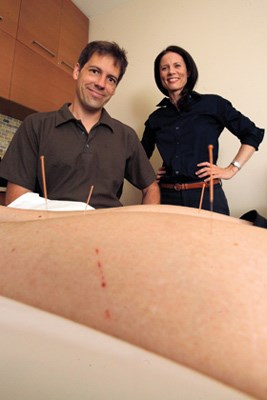RUNNERS and hikers can attest that tendon pain is no laughing matter, but a team of physiotherapists is attempting to enhance current treatments with a new study.
Lyndal Solomons, a North Vancouver physiotherapist, and Alex Scott, a physiotherapist and assistant professor with the UBC faculty of medicine, are recruiting patients for a new study on Achilles tendon pain management.
"The goal of the trial is to examine whether or not adding different forms of acupuncture therapy to the rehabilitation in patients with Achilles tendinopathy is effective," says Scott.
The 12-week study will be run out of both the Canopy Integrated Health clinic and Kinetic Rehabilitation Centre where Solomons works, says Scott. They are hoping to have 42 participants, aged 19 to 60, to complete the initial 12 weeks and the subsequent follow-up questionnaires at the six-and 12-month marks. Participants must have experienced Achilles pain for at least three months.
"What we're really looking for is the effect of IMS, intramuscular stimulation," says Solomons. "It's when you use acupuncture needles and mainly it's to release tight muscles."
Study participants will be randomly assigned to one of three treatment groups and won't know which type of acupuncture treatment they are receiving, says Scott.
"There will be two different acupuncture groups getting slightly different treatments and there will be one group which doesn't receive any acupuncture," he says. "But all three groups will get personalized, gold standard rehabilitation which involves a full biomechanical assessment, hands-on techniques as appropriate and an individualized exercise program."
Scott says an assessor will evaluate the success of the treatments but will not know which treatment the patient received, creating an "unbiased way of comparing the treatments."
The IMS technique, says Solomons, was developed by Vancouver-based Dr. Chan Gunn, taking a tool from Eastern medicine, the acupuncture needle, but applying a Western framework to it.
"We're using needles on a basis of what we know now in terms of modern anatomy and
modern nerve physiology. Acupuncture needles are an amazing tool because in terms of what we now understand, what they do is they create a wound in the tissue which is clearly obvious," says Solomons. "What's important about that is your body protects it and it wants to heal it, and when it does that it forms an electrical current, we call that the current of injury, and it's the current of injury that seems to have these effects on people's tissues."
With this technique, says Solomons, you can introduce an electrical current wherever you want.
"You can use an electrical current to have effects on people's bodies in really quite amazing ways, considering you are just using this tiny little needle," she says. "Its really about using this current of injury and introducing it, as far as IMS goes, introducing that current into tight muscles and when you introduce that current into tight muscles the muscle relaxes."
There is only a small amount of evidence that acupuncture is helpful for Achilles tendon pain, says Scott, but not a good randomized control trial and that's what they are hoping to accomplish with this study.
"That's really the next level of evidence that's needed to find out whether in fact it's helpful," he says. "A lot of therapists are using it and a lot of patients swear by it, but we really need a stronger level of evidence than just clinical anecdotes or testimony."
Achilles tendon pain can have multiple causes, he says. "Aging is certainly one of the main risk factors because as we get older our tendons get stiffer which makes them more prone to be injured," says Scott, adding that injuries tend to occur in people heading into their late 30s and 40s but can also occur in young people. "The other main risk factor is engaging in activities which actually strain the tendon beyond its ability to bear that load, so you get areas of micro injury to the cells, within the tendon, that build up over time and gradually have an accumulation of repair tissue in there rather than normal healthy tendon."
Solomons says that runners tend to be the biggest group, with one in 10 runners suffering Achilles problems.
"They're the people that really use their tendons heavily in the way that damages tendons," she says.
Both Solomons and Scott are encouraging people to participate in the study.
"A lot of people who have had tendon problems, they often just sort of give up on it and they stop running or that sort of thing, which is really unfortunate," says Solomons. "Particularly on the North Shore, there are so many people that do run so we're just kind of hoping people will notice it and see that it's an opportunity for them individually, but also collectively so that we can use the research to make tendon pain management better."
Scott says he wants a good, well-conducted study and the outcome could achieve "a new gold standard for Achilles tendon treatment."
"Personally I am a strong advocate for individualized, exercisebased rehabilitation as the best treatment for this condition and so the good thing is that all three patient groups will be receiving that," he says. "I think if one of the acupuncture groups shows even better outcomes when you add acupuncture to that rehabilitation regime, then I think that will be fantastic."
To participate in the study, contact Alex Scott at 604-875-4111 ex. 21810, or Lyndal Solomons at 778-858-8903.
News Photo Kevin Hill / NORTH Vancouver physiotherapist Lyndal Solomons and UBC's Alex Scott are looking for subjects for a study on acupuncture treatment for Achilles pain.;



